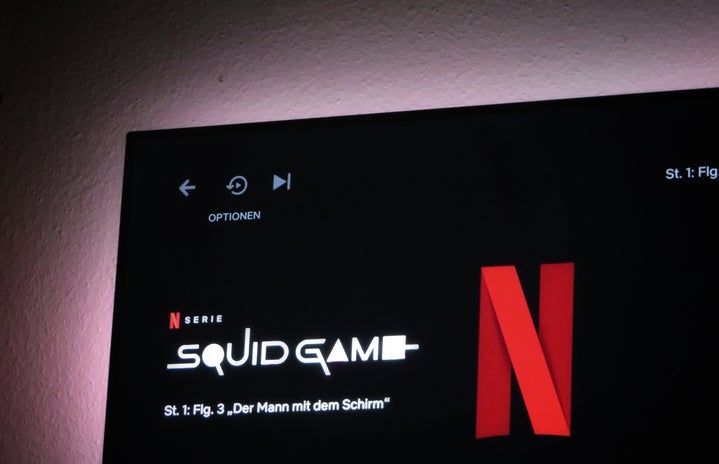*Spoilers ahead*
One of the most talked-about shows of this year, Squid Game, has gone viral, easily becoming one of Netflix’s most successful series. Like many other fans of the show, I was inspired to first give it a watch after seeing countless viral memes about cutting shapes out of honeycomb and making interesting hair dye decisions. However, despite providing an interesting commentary on oppressive capitalist social structures, I found myself sympathising most with the show’s female protagonists. I do not think it’s fully fair to simply write off Squid Game as an inherently misogynistic show; nonetheless, I do think that the plot does not do justice to the backstories, motivations and complexities of its female characters.
Aside from being the perfect amalgamation of Black Mirror and The Hunger Games in its representation of capitalism’s faults, Squid Game does make broader commentaries on casual sexism. In the initial episodes, I was happy that the show did not fall into the easy trope of uniting female characters simply because of their gender. For instance, Sae-byeok (No. 67) and Mi-nyeo (No. 212) are two of the most prominent women in the show, yet they could not have been more different, which makes me glad that the two were not forced to bond together.
We only see two female characters genuinely unite during the marble game, in which Ji-yeong (No. 240) sacrifices herself after hearing Sae-byeok’s dreams. While this scene was incredibly poignant, I still felt as though more could have been done to explore both characters’ backstories. For example, Sae-byeok’s position as both a woman and a North Korean refugee could have been engaged with in much greater depth. Furthermore, Ji-yeong’s story proves to be equally heart-breaking, as she explains how she has just been released from prison after killing her abusive father as a child. These mere ten minutes of intense female friendship and solidarity somewhat make up for the rest of the show, which often overlooks characters’ distinctly gendered experiences of the games.
Sae-byeok is now one of the most popular characters from the show, and rightly so. Her character is incredibly ambitious, driven and intelligent, as well as being one of the first to actually try to explore the dystopian playground the contestants are trapped in. However, despite Sae-byeok’s immense likeability, her death right before the final round of the games highlights how the show is definitively male-centric. Falling into the stereotype of two men physically fighting to the death during the final round, the script writers make it apparent that as a woman Sae-byeok has no place in this male sphere.
The cause of her death is even more frustrating. Losing fatal quantities of blood from a particularly large shard of glass that stabs her during the aftermath of the penultimate round, our last moments with Sae-byeok are at her weakest and most vulnerable, heavily contrasting the strong character we witness throughout the previous episodes. I could not help but feel that this was an easy way to get rid of a character who could have very easily won the games. Why ensure that Gi-Hun ends up in the final regardless of all the mistakes he makes throughout the show? Surely it would have been more interesting to see the final round feature Sae-byeok and Sang-woo in the ultimate battle between ‘good’ and ‘evil’?
It is difficult to assess the extent to which Squid Game is inherently misogynistic. The amount of male characters clearly outnumbers the female characters, despite poverty disproportionately affecting women. There are also obvious examples of casual sexism throughout the show. Take the tug of war competition: women are actively avoided in the team selection process as a result of their supposed physical weakness. While the games themselves do not necessarily favour male competitors, the inherent biases amongst the majority of participants put the Squid Game’s women at a clear disadvantage.
One of the most interesting characters from the show was Mi-nyeo, a brash and often controversial competitor who collaborates with criminal Deok-su to win the games. A master of emotional manipulation and exaggeration, I initially was not the biggest fan of Mi-nyeo’s character. However, it is undeniable that her passionate enaction of revenge against Deok-su was incredibly satisfying. In fact, the majority of Squid Game’s characters are not likeable, and they are not meant to be. After all, they are all willing to kill others for the opportunity to win a cash prize. What I liked most about Mi-nyeo was her acceptance of this selfishness, and her openness surrounding the manipulative aspects of her personality. Though it was frustrating to see her easily persuaded by Deok-su, which played into the tendency to sexualise female characters in line with the male gaze present behind the camera, her ultimate revenge powerfully made up for this character flaw.
Squid Game conveys the continued existence of patriarchal social structures within the bubble of a dystopian arena. Though many viewers fell in love with the show’s female characters, I ultimately could not help but feel uneasy about the script’s treatment of these protagonists. Was it too idealistic of me to want Sae-byeok to win the games and achieve her dreams? Perhaps. Regardless, the show at least attempts to highlight these inherent inequalities, despite not exploring them in as much depth and complexity as desired by its audience.


